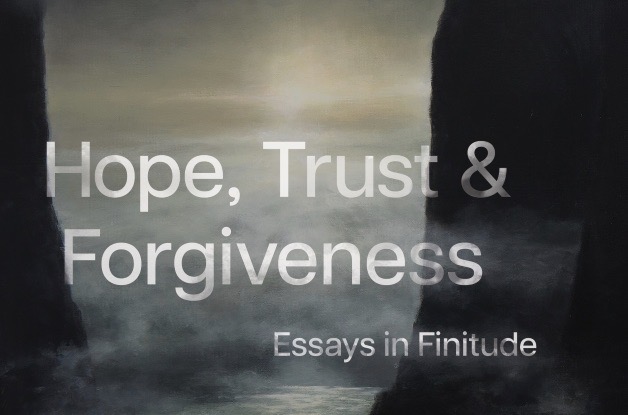On the occasion of the publication of Professor John Lysaker’s sixth monograph , Hope, Trust, and Forgiveness: Essays in Finitude, Philosophy Department Chair, Noëlle McAfee, posed to him some questions.
Noëlle McAfee: What prompted you to write Hope, Trust, and Forgiveness?
John Lysaker: I wanted to generate believable portraits of, for lack of a better term, moral excellence in hoping, trusting, and forgiving. I wanted to show that each can be reason-responsive even as they force the giving and taking of reasons to address the messiness of life: non-generalizable situations, affect, desire, and above all, limited knowledge. I wanted these portraits because each is vital. Life is worse when we lack a capacity to hope, trust, and forgive. But each is difficult to navigate and to theorize, so I thought there was work to be done. None are simply voluntary, but neither are they involuntary. Sometimes we want to hope, trust, or forgive and just can’t find it in ourselves to do so. Nor are any sufficiently oriented by social convention or universalizable principles. Each individuates us and forces us to find our own way. Finally, each breaks down any neat divide between the cognitive, affective, and conative or erotic. Given all this complexity, existential and theoretical, I felt compelled to articulate a way of addressing it, acknowledging it, but also to respond to it with thoughts that might be of value to others.
NM: What surprised you the most when you were doing your research for the book?
JL: As I dug into each, I was struck by how unscripted ethical life gets when we wonder whether to hope, trust, or forgive. Not that we navigate these phenomena without inherited scripts. But they only go so far. And where they run out, I think we see ethical life at its most basic: responsive, inventive, finite, and fragile. And I came to think that the chief lines of moral theory, which either defer to convention or try to fashion universalizable norms, handle ethical life in the clumsily, which has prompted another book that looks at ethical life more directly through the experience of friendship. While writing the book, I almost wanted to say: traditional moral theories make us worse than we can be and so ought to be.
NM: That’s funny. You almost wanted to say this … and you kind of just did. Is there anything unusual about the book?
JL: These phenomena demanded (I think) the kind of writing I developed in my last book, Philosophy, Writing, and the Character of Thought, what I now call the aphor-essay. An aphor-essay is composed of shorter, condensed observations, arguments, and explorations of phenomena that, when taken as a whole, generate portraits of phenomena and exemplify a way of navigating those phenomena through conversation with multiple usages, texts, and traditions. The book thus aspires to a kind of intimacy with its reader that is very unusual in philosophy. But it also generalizes beyond the intimacy of that encounter to offer ways of handling complex situations. And that also is unusual in a book written in such an interpersonal manner.
NM: What do you want the reader to take away from the book?
JL: This is very much a book in ethics, meaning, it tries to intervene in ethical life, to articulate ways in which we can lead better lives. And as we live them, not just as we talk about them as philosophers. The aphor-essay, as I explain in a Preface, is designed in part to draw the reader into a fresh encounter with the phenomenon. Yes, I present and defend a conception of each, and yes, I argue against other conceptions, but the goal, the hope even, is that through that, readers will recall and think through their own scenes of hope, trust, and forgiveness. I want readers, even if they disagree with me, to take away a sense of having been empowered in scenes of hope, trust, and forgiveness, of being better able to handle the occasions each presents. Philosophy should return us to ourselves in a refreshed, intensified manner. I hope readers experience that relative to hope, trust, and forgiveness.
NM: What about this project do you think is most transformative?
JL: That is so hard to say given how much of the work of philosophy rests with the addressee. I say that given what I say above, this is foremost a book in ethics, and as Aristotle says, we do ethics to become better people. And I cannot fulfill that task simply by writing. But I know what the questions mean. Let me say three things by way of the language of scholarly contribution. One, the book shows, I think, that one can acknowledge finitude and alterity and say so much more than what we find in Levinas and later Derrida. Second, the book discloses and remains within scenes of ethical life that are conceptually and descriptively rich. Are they richer than what one usually finds in ethics and moral theory? Perhaps. That was the goal at any rate, although a lot of good work already exists on each of the topics, and I was humbled but also inspired while researching the project. Finally, the book tries to prove, by example, that one can commit to what has come to be called, following Cavell, moral perfectionism and still do first-order normative ethics. Moral perfectionism is committed to a kind of radical accountability and regards being accountable as integral to ethical life. Can one do that and offer readers potentially representative accounts of ethical phenomena? I think I’ve shown one can.
NM: Thank you, John.
John Lysaker’s new book launches with an event on November 30 at 7 p.m. at Manuel’s Tavern for Hope, Trust & Forgiveness, sponsored by Atlanta’s A Cappella Books.

